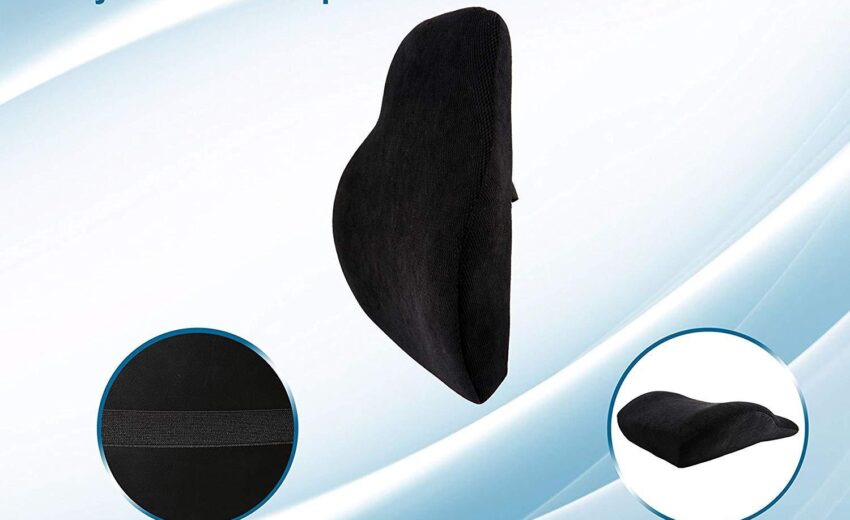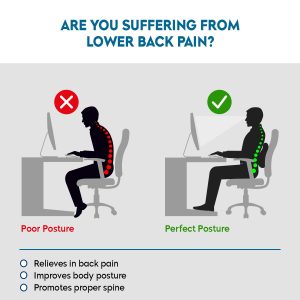
The Benefits Of Using A Back Support Pillow
When it comes to sleep, comfort is key. The best way to make sure you don’t have a restless night of sleep is to invest in a pillow that offers proper support for your head, neck, and spine. The best back support pillow can help ease pain or discomfort in the neck and shoulder area, as well as improve circulation to your head. Also, you should look for a pillow that is fluffy enough so that your neck doesn’t hurt from having the weight of your head push it down. And finally, given the importance of sleep to your overall health and well-being, we recommend investing in a pillow that offers proper support for your head and spine.
What is a Back Support Pillow?
A back support pillow is a type of pillow that helps to relieve back pain. Back support pillows are made from different materials, including memory foam, latex, and cotton. They are designed to sit directly on the spine and provide support for the head, neck, and lower back.
Back support pillows can be used at home or while traveling. They are also a good choice for people who work in an office or have regular physical activity.
The Benefits of Using a Back Support Pillow
 There are many benefits to using a back support pillow. Here are five of the most common:
There are many benefits to using a back support pillow. Here are five of the most common:
1) Back pain is a common problem. A back support pillow can help to reduce or eliminate back pain.
2) A back support pillow can improve circulation in the neck and upper body.
3) A back support pillow can help to reduce stress and tension in the shoulders and neck.
4) Back support pillows can improve sleep quality by supporting the head and neck while you sleep.
5) Back support pillows can help to prevent cervical spine curvature (aka “cranio malalignment”).
How to Pick The Best Back Support Pillow
 Choosing the right back support pillow can be a difficult task. There are many different types and brands to choose from, and it can be hard to know which one is right for you. Here are some tips on how to choose the best back support pillow:
Choosing the right back support pillow can be a difficult task. There are many different types and brands to choose from, and it can be hard to know which one is right for you. Here are some tips on how to choose the best back support pillow:
1. Consider your sleeping habits. If you tend to toss and turn a lot, a pillow with a softer fill will be more comfortable than one with a harder filling.
2. Think about your posture. A back support pillow that is designed to help you maintain good posture will be more comfortable and supportive than one that does not.
3. Consider the size of your bed. A back support pillow that is too large or too small will not be very effective. Make sure the size of the pillow is appropriate for your height and width as well as the depth of your mattress.
4. consider the type of cover. Some back support pillows come with a cover that can be removed and washed, while others are covered in a fabric material that is machine-washable but cannot be replaced if it becomes dirty or torn.
5. Think about price and quality. Some lower-quality back support pillows are more expensive than others, so it is important to think about quality and affordability before making your purchase.
For those of you who have back problems or suffer from a little discomfort when sleeping in certain positions, then a lumbar support pillow that provides proper support will be especially beneficial to you.
Your Top Reasons To Own A Back Support Pillow
If you’re looking for a way to improve your sleeping habits, the back support pillows might be the answer for you. Here are some of the benefits of using one:
1. Better Overall Sleep Quality
A back support pillow can help you achieve better overall sleep quality. By supporting your neck and spine, it can help to improve your sleep posture and alignment. This can lead to improved sleep quality and an overall smoother sleep cycle.
2. Improved Head Circulation
A back support pillow can help improve head circulation. By supporting your head and neck, it can help to increase blood flow to the brain and other areas of the body. This can help to improve your cognitive function and energy levels during the day.
3. Reduced Neck Pain
A back support pillow can reduce neck pain by supporting your neck and spine. By doing this, it can help to reduce pressure on your spinal cord and nerve roots. This can lead to reduced pain in your neck and lower back area.
4. Reduced Anxiety Levels
Using a back support pillow can reduce anxiety levels by helping you relax and de-stress. By supporting your neck and spine, it can help to reduce tension in your shoulders, neck, and chest . This can help to reduce stress and tension, which can lead to reduced anxiety levels.
Brief History of the Pillow
 The history of the pillow is one fill with both convenience and comfort. The modern lumbar support cushion first appeared in Asia Minor in the 6th century BC. It was use as a means to elevate the head and relieve tension in the neck. In India, the pillow became popular as a way to promote deep sleep.
The history of the pillow is one fill with both convenience and comfort. The modern lumbar support cushion first appeared in Asia Minor in the 6th century BC. It was use as a means to elevate the head and relieve tension in the neck. In India, the pillow became popular as a way to promote deep sleep.
The first American patent for a pillow was filed in 1887 by Charles C. Thompson of Springfield, Massachusetts. As bed became more popular and people began working on their computers in bed, more people began using pillows for other purposes such as placing snacks and drinks near their heads or for general support. Pillows were also create specifically for children to help them sleep better.
Today, there are many types of pillows on the market, from standard pillows to neck pillows, back supports, memory foam pillows, and pregnancy pillows. Some people prefer to buy individual pillows while others prefer to purchase sets that include several different types of pillows. There are even foam-filled pillows designed specifically for pets!
Why Should You Use A Back Support Pillow?
There are many benefits to using a back support for chair, both for those who suffer from back pain and for those who want to prevent it from occurring in the first place. Here are just a few of the reasons why using a back support pillow is so beneficial:
1. Back support pillows can help to alleviate pain and stiffness in the neck, shoulders and spine.
2. They can improve sleep quality by providing support for the head and neck.
3. Back support pillows can also help to reduce stress levels by providing relief from fatigue or tension in the neck, shoulders and spine.


